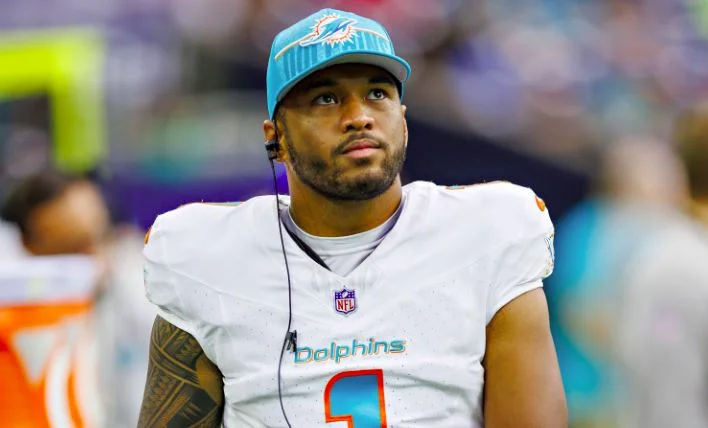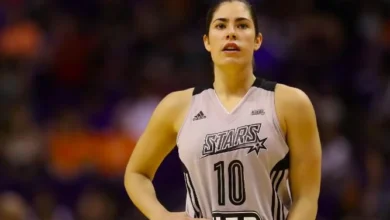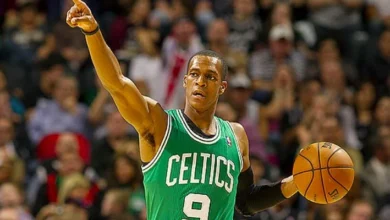
Tua Tagovailoa Ethnicity and Parents Origins
Tua Tagovailoa, the star quarterback for the Miami Dolphins, has quickly become one of the most recognized names in the NFL. His rise to fame can be attributed not only to his impressive athletic talent but also to his unique background, which reflects a rich cultural heritage. Understanding Tua’s ethnicity and the origins of his parents provides insight into the influences that have shaped him both on and off the field. This article explores Tua Tagovailoa’s ethnic background and the roots of his family, highlighting the significance of their heritage in his life and career.
Tua Tagovailoa Ethnicity and Cultural Heritage
| Category | Athletes |
|---|---|
| Full Name | Tua Tagovailoa. |
| Birthdate | March 2, 1998. |
| Birthplace | Ewa Beach, Hawaii. |
| Ethnicity | American Samoa descent. |
| Father Ethnicity | American Samoa descent. |
| Mother Ethnicity | American Samoa descent. |
Tua Tagovailoa identifies as Samoan, reflecting his family’s deep-rooted connections to the Samoan community. This identity plays a crucial role in shaping his character and values. The Samoan culture is characterized by its strong emphasis on family, respect, and community, which are core tenets that have profoundly influenced Tua’s upbringing and outlook on life.
Tua Tagovailoa Importance of Family
In Samoan culture, family is paramount. Tua’s upbringing was heavily influenced by the concept of aiga, which refers to the extended family. This concept goes beyond mere blood relations and includes the community at large. The tight-knit structure of Samoan society ensures that children are surrounded by supportive relatives, fostering a sense of belonging and accountability. Tua’s close relationship with his family has been vital in maintaining his humility and dedication to his craft.
Tua Tagovailoa Role of Elders
Samoan culture places significant importance on the wisdom of elders, who are revered for their life experiences and knowledge. This respect for older generations is ingrained in Tua’s family values, where listening to and learning from elders is emphasized. Tua often acknowledges the guidance he has received from his parents and grandparents, which has shaped his moral compass and approach to challenges in his life and career.
Tua Tagovailoa Rich Cultural Traditions
Samoan culture boasts a vibrant tradition of storytelling, music, and dance, all of which celebrate communal ties and historical narratives. These traditions not only serve as a means of preserving cultural heritage but also foster a sense of pride among Samoan individuals. Tua’s connection to these traditions is evident in his public appearances and interactions, where he often expresses gratitude for his cultural roots and the community that supports him.
Tua Tagovailoa Physical Attributes and Athletic Legacy
Tua’s physical attributes and playing style resonate with the characteristics commonly associated with Samoan athletes. Known for their strength, agility, and resilience, Samoan athletes have made significant contributions to various sports, including football, rugby, and wrestling. Tua stands out as part of this athletic legacy, embodying the physical prowess and competitive spirit that characterize many successful Samoan athletes.
Tua Tagovailoa Inspiration for Future Generations
Tua’s success story serves as a beacon of inspiration for younger generations within the Samoan community and beyond. His achievements demonstrate that hard work, perseverance, and a strong connection to one’s roots can lead to remarkable accomplishments. By excelling in the NFL, Tua not only elevates his family’s name but also uplifts the Samoan community, encouraging aspiring athletes to chase their dreams while honoring their heritage. This inspiration is vital, as it fosters a sense of hope and aspiration among young Samoans, reinforcing the idea that they, too, can achieve greatness in sports and life.
Tua Tagovailoa Parents’ Origins
Tua Tagovailoa was born on March 2, 1998, in Ewa Beach, Hawaii, to parents with deep roots in American Samoa. His father, Galu Tagovailoa, emigrated from the island of Tutuila, one of the main islands in American Samoa. Galu’s journey to the United States was motivated by a desire to provide better opportunities for his family. His mother, Diane Tagovailoa, shares similar origins, coming from the same region. This strong connection to their homeland has profoundly influenced Tua’s identity, embedding a sense of pride in his Samoan heritage from an early age. His parents’ stories of resilience and hard work inspired Tua to embrace his culture and strive for excellence in all areas of his life.
Galu Tagovailoa serves as both Tua’s father and a significant mentor. His influence extends beyond football; Galu instilled values of discipline, respect, and perseverance in his children. He coached Tua throughout his formative years, nurturing his talent and helping him hone his skills. Meanwhile, Diane Tagovailoa ensured that Tua and his siblings remained grounded and connected to their cultural roots. Family gatherings were rich with traditional Samoan customs, which reinforced their identity. These experiences taught Tua the importance of community and loyalty, shaping him into the athlete and person he is today.
Tua Tagovailoa Siblings and Family Dynamics
Tua Tagovailoa, the talented quarterback for the Miami Dolphins, comes from a close-knit family that includes several siblings who play significant roles in his life. Growing up in a supportive household in Ewa Beach, Hawaii, Tua’s relationships with his siblings have profoundly influenced his personal development and career. This article explores Tua Tagovailoa’s siblings, their backgrounds, and the dynamics within their family, highlighting the importance of these relationships in shaping Tua’s character and journey.
Siblings of Tua Tagovailoa
Tua Tagovailoa has three siblings: two brothers, Taulia and Matt, and one sister, Taysia. Each sibling has unique qualities and achievements that contribute to the family’s legacy and reflect their close relationship.
Tua Tagovailoa Younger Brother Taulia Tagovailoa
Taulia Tagovailoa, born on July 26, 2002, is Tua’s younger brother and a talented football player in his own right. Like Tua, Taulia has pursued a career in football and currently plays as a quarterback. He began his college football journey at the University of Alabama, where he played under the same coaching staff that developed Tua.
Taulia transferred to the University of Maryland, where he continued to make a name for himself. Tua has often spoken about the sibling rivalry and camaraderie they share, which motivates both of them to excel in their respective careers. The brothers have a strong bond, supporting each other’s ambitions and celebrating their successes together.
Tua Tagovailoa Older Brother Matt Tagovailoa
Matt Tagovailoa, Tua’s older brother, is not as publicly known as Tua and Taulia but has been a significant influence in their lives. Matt is known for his athletic ability and played football during his high school years. While he may not have pursued a collegiate football career like his brothers, Matt has been an unwavering source of support for Tua and Taulia. He often shares insights and encouragement with them, fostering a positive environment for their pursuits.
Tua Tagovailoa Younger Sister Taysia Tagovailoa
Taysia Tagovailoa, Tua’s younger sister, is also an important part of the family dynamic. While she has not pursued a career in athletics, Taysia has been a significant source of inspiration and motivation for her brothers. She shares a close bond with Tua, often attending his games and supporting him from the sidelines. The siblings have a shared love for their Samoan heritage, and Taysia often engages in community and cultural activities that reinforce their family values.
Tua Tagovailoa Family Dynamics
The Tagovailoa siblings share a deep connection, rooted in their Samoan heritage and values. Their parents, Galu and Diane Tagovailoa, have instilled a strong sense of family loyalty and support in their children. The siblings often come together to celebrate achievements, whether in sports or academics, fostering a culture of encouragement and pride within the family.
Tua’s experiences as an older brother have also shaped his leadership skills, both on and off the field. He often emphasizes the importance of being a role model for his younger siblings, encouraging them to pursue their passions and strive for excellence.
Tua Tagovailoa Professional Career
Tua Tagovailoa, the talented quarterback for the Miami Dolphins, has made a significant impact on the NFL since being drafted in 2020. Known for his accuracy, leadership, and strong decision-making skills, Tua has quickly emerged as one of the league’s promising young quarterbacks. This article delves into his professional career, highlighting key milestones, achievements, and challenges he has faced along the way.
Tua Tagovailoa College Career A Foundation for Success
Tua Tagovailoa’s professional career is rooted in an impressive college career at the University of Alabama. After joining the Crimson Tide in 2017, he quickly became a standout player. In his freshman season, Tua gained national attention when he replaced an injured Jalen Hurts in the second half of the 2018 College Football Playoff National Championship Game against Georgia. He led the team to a thrilling 26-23 victory, throwing a 41-yard touchdown pass in overtime and securing his place in Alabama football history.
During his college career, Tua showcased his exceptional talent, throwing for 7,442 yards, 87 touchdowns, and just 11 interceptions over three seasons. He led Alabama to two national championship games and was named the SEC Offensive Player of the Year in 2018. His accomplishments earned him numerous accolades, including being a finalist for the prestigious Heisman Trophy in 2018. After the 2019 season, Tua declared for the NFL Draft, where he would begin the next chapter of his career.
Tua Tagovailoa NFL Draft and Early Challenges
The Miami Dolphins selected Tua with the fifth overall pick in the 2020 NFL Draft, marking a significant moment for both the franchise and the player. Fans held high hopes for Tua, viewing him as a franchise quarterback who could lead the Dolphins back to prominence.
However, Tua’s early professional career was marred by challenges. He faced a serious hip injury during his final college season, which raised concerns about his durability and future performance in the NFL. Despite these concerns, the Dolphins were confident in his abilities and provided him with a supportive environment to develop.
Tua made his NFL debut on October 20, 2020, against the Los Angeles Rams. He finished the game with 93 passing yards and a touchdown, leading the Dolphins to a 28-17 victory. Throughout his rookie season, Tua experienced ups and downs as he adjusted to the pace of professional football. He played in 10 games, starting in nine, and completed 64.1% of his passes for 1,814 yards, 11 touchdowns, and 5 interceptions. Despite the team’s overall success, Tua faced criticism for his performance, particularly regarding his ability to throw deep passes and read defenses effectively.
Tua Tagovailoa Growth and Development
The 2021 season marked a pivotal year for Tua as he continued to grow and adapt to the NFL’s challenges. The Dolphins hired head coach Brian Flores, who emphasized a more balanced offensive approach. Tua demonstrated significant improvement in his second season, showcasing better decision-making and improved statistics. He completed 67.8% of his passes for 2,653 yards, 16 touchdowns, and 10 interceptions over 13 games.
Despite individual growth, the Dolphins struggled as a team, leading to questions about Tua’s long-term future in Miami. However, Tua remained resilient, focusing on his development and working closely with his coaching staff. He also emphasized the importance of maintaining a positive mindset, which helped him navigate the ups and downs of the season.
Tua Tagovailoa Breakout Season and Recognition
Tua Tagovailoa’s breakout season came in 2022, as he solidified his position as the Dolphins’ starting quarterback. With a talented supporting cast that included wide receivers Tyreek Hill and Jaylen Waddle, Tua flourished in the Dolphins’ offensive scheme. He achieved remarkable statistical success, completing 64.8% of his passes for 3,548 yards, 25 touchdowns, and just 8 interceptions over 13 games.
His performance during the 2022 season earned him recognition as one of the top quarterbacks in the league. Tua showcased his ability to make quick decisions, throw accurately, and lead his team effectively. He recorded multiple games with three or more touchdown passes, including a standout performance against the Baltimore Ravens, where he threw for six touchdowns in a single game.
Despite the Dolphins’ playoff appearance, Tua faced challenges with injuries during the latter part of the season, which raised concerns about his long-term health. However, his resilience and dedication to the game remained evident, and he continued to work hard to improve his game and stay on the field.
Conclusion
Tua Tagovailoa’s ethnicity and his parents’ origins significantly shape who he is as both an athlete and an individual. His Samoan heritage is not only a source of pride but also a driving force behind his commitment to excellence in sports. Growing up in a household that emphasized the importance of cultural values, Tua learned early on the significance of hard work, respect, and community. These lessons have become cornerstones of his identity, both on and off the field. His journey from Ewa Beach to becoming the starting quarterback for the Miami Dolphins is a testament to the strength of his cultural roots and family support.
The values imparted by his parents, Galu and Diane, have equipped Tua with the resilience, humility, and determination needed to succeed at the highest levels of football. They taught him to embrace challenges and learn from setbacks, which has been crucial in navigating the pressures of professional sports. As he continues to make waves in the NFL, Tua serves as an inspiring figure for aspiring athletes, particularly those from Samoan and Pacific Islander backgrounds. He reminds them of the importance of cultural heritage and the power of family support in achieving their dreams, encouraging young athletes to honor their roots while striving for greatness.



